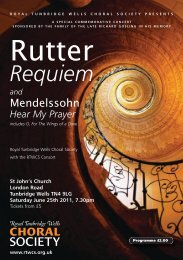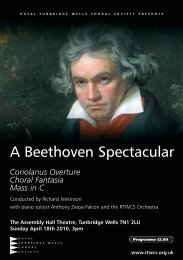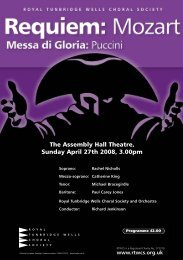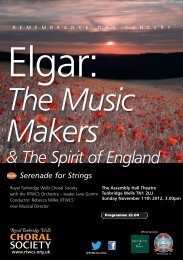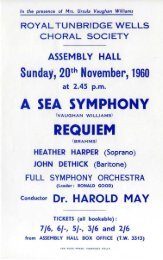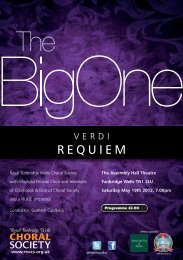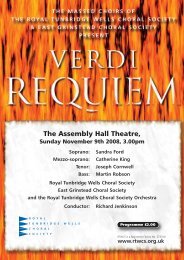ROSSINI - Royal Tunbridge Wells Choral Society
ROSSINI - Royal Tunbridge Wells Choral Society
ROSSINI - Royal Tunbridge Wells Choral Society
You also want an ePaper? Increase the reach of your titles
YUMPU automatically turns print PDFs into web optimized ePapers that Google loves.
Gioacchino Antonio Rossini<br />
Rossini was bom at Pesaro in 1792 and moved with his parents to Bologna at the time<br />
Napoleon’s troops entered Northern Italy. Rossini had a musical upbringing, starting composing<br />
at about the age of twelve, and writing seriously for the theatre in his late ‘teens’. He studied<br />
at the University of Bologna, becoming an enthusiast for the music of Mozart, who had died<br />
the year before Rossini was bom. Rossini later referred to Mozart as ‘the admiration of my<br />
youth, the desperation of my mature years and the consolation of my old age’.<br />
Rossini achieved both fame mid fortune early in his career, continuing writing operas until<br />
1829, including The Thieving Magpie, best remembered for its sparkling Overture which is being<br />
performed today. In this period he held positions as Musical Director of theatres in Naples<br />
and later in Paris. However, in 1829, his last opera William Tell was produced and he<br />
‘retired’, having written thirty-six operas. He wrote nothing until 1855 when he began writing<br />
again, mainly songs and piano pieces. During this last period, he was asked by a friend, Countess<br />
Louise Pillet-Will to write a mass for the consecration of a private chapel; it was first performed<br />
in Passy near Paris in March 1864. In his annotations to the autograph copy of the<br />
score, Rossini referred to the composition as ‘the last mortal sin of my old age’ and at the end<br />
wrote ‘Good Lord, there it is, finished, this poor little mass. I do not know if this music is sacred<br />
or sacrilegious. I was bom for comic opera as You well know. Little skill, some feeling<br />
and that’s all. Therefore let me sing Your praises and grant me Your paradise.3 His 'little’ has<br />
stuck to the work so that it is frequently referred to as the ‘Petite’ Messe Solennelle, in spite of<br />
taking over 80 minutes to perform!<br />
The ‘little mass’ was the last of Rossini’s major compositions and was immediately received<br />
enthusiastically by Meyerbeer and other musical eminences in Paris of the day. While commissioned<br />
for small forces, Rossini clearly envisaged performance on a larger scale and he<br />
orchestrated it a year or two later though this setting was not performed in his lifetime. The<br />
hand of the opera composer undoubtedly shows in the writing, but does not dominate. Indeed<br />
some sections could be taken as Rossini showing his mastery of form with affinities to older<br />
styles eg the strict canon of the unaccompanied Christe Eleison early in the work. This is<br />
framed by two Kyrie sections, where the smooth vocal parts are underlain by rhythmic piano<br />
writing in a quite different style. Occasionally, in such solos as Domine Deus aid Quoniam,<br />
the theatre takes over, and there are times when the Rossini ofl863 comes stylistically close<br />
to Verdi. This perhaps is less to be wondered at than the contrapuntal skill and vitality of the<br />
fugal sections Cum Sancto Spiritu and In Vitam Venturi. The instrumental Preludio Religioso<br />
certainly offers a rare glimpse of a more serious and academic Rossini than might be<br />
expected by listeners who know only the operas he composed up to 1829, the time of William<br />
Tell. The work contains the full text of the High Mass - hence ‘solennelle’ in the title - but in<br />
addition, Rossini has set O Salutaris Hostia, a text suitable for the feast of Carpus Christi.<br />
These programme notes were prepared with the assistance o f the NFMS<br />
Programme-Note Bank




